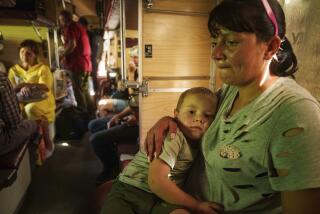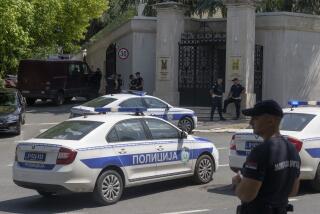Defiant Serbs Shell Villages in Kosovo
- Share via
GLOBARE, Yugoslavia — Washington’s latest bombing threat fell on deaf ears in Kosovo as the Serbian security forces’ heavy guns drove thousands of terrified ethnic Albanians from their homes Saturday.
While Yugoslav troops and Serbian police intensified two offensives in northern Kosovo province, about 1,400 international peace monitors headed in the opposite direction to safety in the neighboring nation of Macedonia.
Refugees fleeing the Serbian onslaught said the attack started just before dawn, only hours after President Clinton warned that a defiant Yugoslav President Slobodan Milosevic had already gone too far.
The North Atlantic Treaty Organization has about 400 warplanes, including 200 U.S. aircraft, ready to strike Serbian military targets if Secretary-General Javier Solana issues the order.
In Washington, senior Clinton administration officials met at the White House on Saturday to discuss the new developments in Kosovo.
David Leavy, spokesman for the National Security Council, said of the new Serbian action: “This is clearly a very serious situation, one we are watching closely and with great concern. As the president said [Friday], President Milosevic’s continued intransigence and continued aggression is responsible for this continuing conflict.
“We are moving forward in consultation with our allies. NATO stands prepared to take further action if it’s necessary.”
Clinton refused to set a deadline for airstrikes at Friday’s news conference in Washington, but several NATO members say their patience with Milosevic is all but exhausted.
In Bonn, German Defense Minister Rudolf Scharping said Saturday that Milosevic must sign a proposed Kosovo peace deal or face airstrikes.
“There is no room for negotiation. Either Milosevic signs the deal or he accepts responsibility for the consequences,” Scharping said in an interview in the newspaper Bild am Sonntag.
With the last international cease-fire observers out of Kosovo, Milosevic’s forces dropped all pretense of restraint and attacked several ethnic Albanian villages on at least three fronts Saturday.
Drita Ajazi, 24, led 65-year-old Begisha Hasani out from the closing jaws of a Serbian pincers movement against a guerrilla stronghold. Then they waited with a few dozen other refugees for a public bus to the capital, Pristina.
“People couldn’t think which direction to escape in because the police and army were everywhere,” Ajazi said after fleeing from the village of Korrotica, about 15 miles southwest of Pristina.
Kosovo is a southern province of Serbia, the larger of two republics in what remains of Yugoslavia. The Kosovo Liberation Army, or KLA, is fighting for the independence of the territory, where 90% of the people are ethnic Albanians.
In Paris on Thursday, the guerrillas joined ethnic Albanian politicians in signing a three-year interim peace accord that offers limited self-rule within Kosovo.
Milosevic rejects the accord, arguing that NATO is violating Yugoslav sovereignty by trying to force him to accept 28,000 NATO peacekeepers in Kosovo under threat of airstrikes.
Milosevic’s hard-line stand is winning strong support among many Serbs, who see NATO as an enemy trying to destroy their nation. They also are confused by NATO’s logic when it threatens to punish Serbia for trying to crush separatists even though Western governments agree that Kosovo must remain part of Yugoslavia.
“The Serbian people are Orthodox Christians, and they trust only in God,” Misa Arsic, 31, said from a bar stool in Pristina, where he sat sipping a cold beer Saturday afternoon. “NATO is not God. Anyway, they are lying. There is not going to be bombing.”
Not all Serbs are so sure this time, and as the real dangers of war with the world’s most powerful military alliance sinks in, the weak internal opposition to Milosevic is becoming more bold.
Military police are out in force, rounding up conscripts for national service. They sparked an anti-draft protest outside army headquarters in the hard-line Serbian city of Leskovac last Wednesday.
About 18 miles north of Ajazi’s village, refugees fleeing the town of Srbica said masked police ordered them out of their homes at gunpoint about 8:30 a.m. Saturday.
Men wearing white uniforms and black masks forced people into the freezing cold with only the clothes they were wearing, refugee Selim Dragaj, 37, told the Reuters news agency after leaving Srbica.
“We didn’t run away. They told us to leave,” Dragaj said. “They said to me: ‘You can take your shoes and go to Albania. . . . Albania is what you wanted, and Albania is what you are going to get.’ ”
Up to 7,000 refugees had taken shelter in Srbica on Friday as Serbian forces advanced, and the exodus from the surrounding region grew so large Saturday that many refugees no longer knew where it was safe to go.
Serbian authorities claim that KLA guerrillas attacked Srbica’s police station, and another in the town of Glagovac, with assault rifles, antitank weapons and mortar bombs about 9 p.m. Friday.
International peace monitors sent here last October to help verify such claims, and to try to restore calm, evacuated their post in Srbica on Friday night to join the 1,400 observers who fled Kosovo on Saturday.
“It’s bad that they left,” Ajazi said through an interpreter. “When I saw them leave the area, I realized that we don’t have anyone now to support us. The danger is severe.”
Limon Dernjani watched the convoy of peace monitors pass through the southern border town of Djeneral Jankovic, where Serbian security forces have been massing for several weeks to defend against a NATO attack.
Security forces also have gone into the surrounding mountains and chased away the ethnic Albanian villagers, who relied on foreign monitors to at least bear witness to what was going on.
“We felt safe when they were here, and now we feel more and more tension,” said Enver Kolizi, 54, as three police carrying AK-47 assault rifles glared at him from the front step of their command post.
The local police have not issued any overt threats yet, but without the monitors to report abuses, that could easily change, Kolizi said through an interpreter.
“We feel that they are abandoning us,” he added.
Heavy fighting also raged Saturday near the northeastern Kosovo town of Podujevo, closing the highway that is the main link between Pristina and the rest of Serbia.
Although the foreign cease-fire monitors, including several hundred Americans, have left Kosovo, a few relief agencies such as the International Committee of the Red Cross and United Nations World Food Program are still here.
“We are deeply concerned about the deterioration of security in Kosovo,” said Mick Lorentzen, who heads the World Food Program’s operation here. “We provide food to 210,000 beneficiaries each month.”
Times staff writer Jim Mann in Washington contributed to this report.
More to Read
Sign up for Essential California
The most important California stories and recommendations in your inbox every morning.
You may occasionally receive promotional content from the Los Angeles Times.













